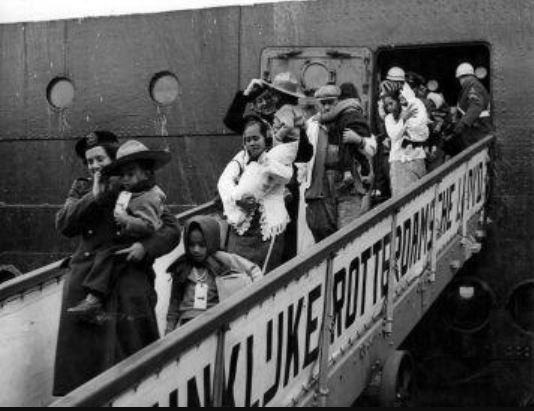Our second Bacarita dari Timur webinar on Friday 14th August, stirred many emotions. Where normally we would link HenryTimisela with laughter, this time we saw a more serious side of him. In new his role as director of the MoluksHistorisch Museum in the Netherlands, he explained to Moluccans around the world, the appalling (and to some still unknown) story of Moluccans who arrived in the Netherlands after the Second World War.
What was only going to be a temporary solution by the Dutch government for KNIL (Koninklijk Nederlands Indisch Leger = Royal Netherlands East Indies Army) soldiers and their families, as they had fought on the Dutch side during the Indonesian war of Independence, became a lasting permanence.
Watching the webinar beside me was my elderly mother, who took the journey herself on the Kota Inten with her parents and siblings. A voyage made even more perilous as my grandmother was heavily pregnant and gave birth to my aunt in the Strait of Gibraltar. But I digress here, as I’m sure each Moluccan family in the Netherlands will have their own story to tell.
The webinar started with a black and white video and photo compilation of KNIL families on one of the ships, the Groote Beer. The younger kids played games and smiled for the camera, innocent and unaware of the future ahead, whilst the older generation approached the journey with trepidation and was more guarded with their emotions. The harsh reality would set in on arrival in that cold and foreign land that had (temporarily) accepted them.
And so, the story began…a beginning of the end, or is it the end of a new beginning? Nearly 12,000 Moluccans arrived, of which 93% were Christians, 5% Muslim and 2% Catholic – a diverse group.
The harsh cold that awaited them was nothing compared to the news that they heard when they finally arrived. Some of the men were still dressed in uniform, so imagine the disillusionment when they heard that their military status was cancelled, had become stateless and that they were not allowed to work.
Ravaged by the Second World War, the Dutch had no proper housing for these Moluccan families, so they were sent to different parts of the country; the biggest settlements were Camp Lunetten in Vught and CampSchattenberg in Westerbork. Both were old German transit camps, with barracks and surrounded by barbed wire. At that time, little was known of the story of Anne Frank, a young Jewish girl, whose diary of her time in hiding became world-famous and had been transported from Westerbork to Auschwitz the concentration camp in Poland.
Although there was no tension in Java and during the long boat journey, there was bound to be some tension in the camps. Frustration and trauma and with their isolated lives in barracks in the forest (like Schattenberg), the men were also not allowed to work in their first year (they received an income of 3 guilders a week) by far not enough to feed their big families. Most of them sought illegal work at local farms and resorted to menial jobs.
Their hope of ‘Hari Natal – Kembali di Rumah’ didn’t materialise and many decades later, in 2020, approximately 65,000 Moluccans still live in the Netherlands spread over 60 Moluccan Wijken (communities).
Henry had taken us right to the beginning of the story, where it all started with the DutchGouden Eeuw – a timeline that started in 1599; the history of the Moluccas; the political decision of repatriation; the turbulent seventies (1975 and 1977), and eventually ended with Moluccan role models of 2020. Despite the shocking history, he closed his presentation with slides of famous Moluccans and their achievements in sport, music and culture in the Netherlands.
Black Lives Matter has made people aware of their origins. Not much is mentioned in Dutch history books about the Moluccans in the Netherlands, so perhaps, it is time to raise our voice again, peacefully and with conviction!
You can watch the webinar (again) on Bacarita dari
Timur - the Shocking Untold Story ofMoluccans in Holland. Our next
webinar will be on Saturday 29th August 2020 (10:00hrs WIT), when NatasiaMalaihollo - founder of Wyezzer - will be talking about the Secrets of a
Successful Start-Up Company.


11_105_90.jpg)




_105_90.png)